
John James Rickard Macleod was a Scottish biochemist and physiologist. He devoted his career to diverse topics in physiology and biochemistry, but was chiefly interested in carbohydrate metabolism. He is noted for his role in the discovery and isolation of insulin during his tenure as a lecturer at the University of Toronto, for which he and Frederick Banting received the 1923 Nobel prize in Physiology or Medicine. Awarding the prize to Macleod was controversial at the time, because according to Banting's version of events, Macleod's role in the discovery was negligible. It was not until decades after the events that an independent review acknowledged a far greater role than was attributed to him at first.

Neuroscience is the scientific study of the nervous system, its functions and disorders. It is a multidisciplinary science that combines physiology, anatomy, molecular biology, developmental biology, cytology, psychology, physics, computer science, chemistry, medicine, statistics, and mathematical modeling to understand the fundamental and emergent properties of neurons, glia and neural circuits. The understanding of the biological basis of learning, memory, behavior, perception, and consciousness has been described by Eric Kandel as the "epic challenge" of the biological sciences.
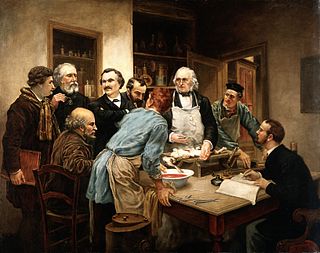
Physiology is the scientific study of functions and mechanisms in a living system. As a sub-discipline of biology, physiology focuses on how organisms, organ systems, individual organs, cells, and biomolecules carry out the chemical and physical functions in a living system. According to the classes of organisms, the field can be divided into medical physiology, animal physiology, plant physiology, cell physiology, and comparative physiology.
Psychophysiology is the branch of psychology that is concerned with the physiological bases of psychological processes. While psychophysiology was a general broad field of research in the 1960s and 1970s, it has now become quite specialized, based on methods, topic of studies and scientific traditions. Methods vary as combinations of electrophysiological methods, neuroimaging, and neurochemistry. Topics have branched into subspecializations such as social, sport, cognitive, cardiovascular, clinical and other branches of psychophysiology.
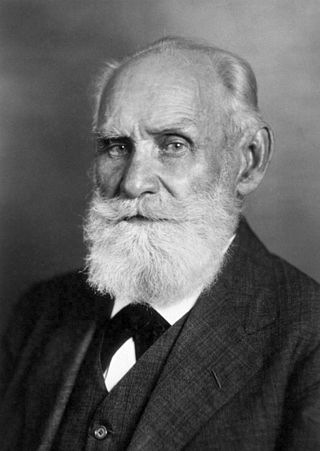
Ivan Petrovich Pavlov was a Russian and Soviet experimental neurologist, psychologist and physiologist known for his discovery of classical conditioning through his experiments with dogs.
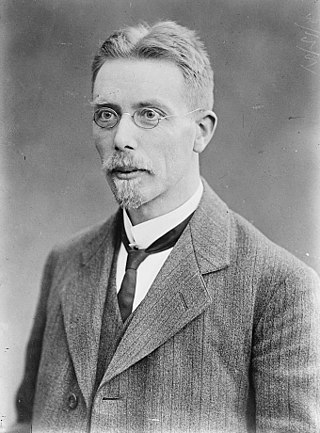
Schack August Steenberg Krogh was a Danish professor at the department of zoophysiology at the University of Copenhagen from 1916 to 1945. He contributed a number of fundamental discoveries within several fields of physiology, and is famous for developing the Krogh Principle.

Sir Alan Lloyd Hodgkin was an English physiologist and biophysicist who shared the 1963 Nobel Prize in Physiology or Medicine with Andrew Huxley and John Eccles.

Vasodilation, also known as vasorelaxation, is the widening of blood vessels. It results from relaxation of smooth muscle cells within the vessel walls, in particular in the large veins, large arteries, and smaller arterioles. The process is the opposite of vasoconstriction, which is the narrowing of blood vessels.
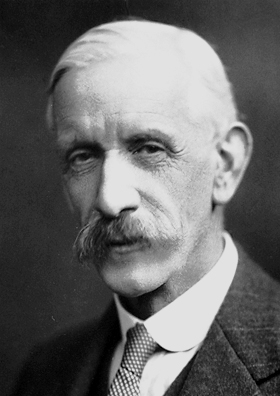
Sir Frederick Gowland Hopkins was an English biochemist who was awarded the Nobel Prize in Physiology or Medicine in 1929, with Christiaan Eijkman, for the discovery of vitamins. He also discovered the amino acid tryptophan, in 1901. He was President of the Royal Society from 1930 to 1935.
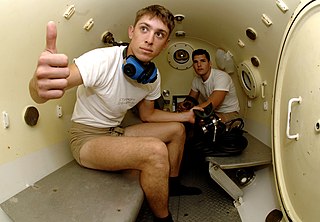
Diving medicine, also called undersea and hyperbaric medicine (UHB), is the diagnosis, treatment and prevention of conditions caused by humans entering the undersea environment. It includes the effects on the body of pressure on gases, the diagnosis and treatment of conditions caused by marine hazards and how relationships of a diver's fitness to dive affect a diver's safety. Diving medical practitioners are also expected to be competent in the examination of divers and potential divers to determine fitness to dive.
Autar Singh Paintal was a medical scientist who made pioneering discoveries in the area of neurosciences and respiratory sciences. He is the first Indian Physiologist to become the Fellow of the Royal Society, London.
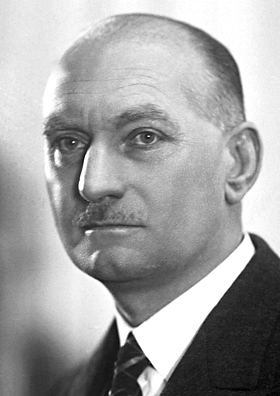
Corneille Jean François Heymans was a Belgian physiologist. He studied at the Jesuit College of Saint Barbara and then at Ghent University, where he obtained a doctor's degree in 1920.

The Physiological Society, founded in 1876, is a learned society for physiologists in the United Kingdom.

Sir Leonard Erskine Hill FRS was a British physiologist. He was elected a Fellow of the Royal Society in 1900 and was knighted in 1930. One of his sons was the epidemiologist and statistician Austin Bradford Hill. His father was George Birkbeck Hill, the famous scholar and commentator on the works of Samuel Johnson, who at the time of his birth was headmaster of Bruce Castle School.

The Journal of Physiology is a semi-monthly peer-reviewed scientific journal that was established in 1878 and is published by Wiley-Blackwell on behalf of The Physiological Society. It covers research on all aspects of physiology, with an emphasis on human and mammalian physiology, including work at the molecular level, at the level of the cell membrane, single cells, tissues or organs, and systems physiology. The full archive back to 1878 up to issues published 12 months from the current date is freely available online. The editor-in-chief is Peter Kohl .According to the Journal Citation Reports, the journal has a 2021 impact factor of 6.228, ranking it ninth out of 84 journals in the category "Physiology"

Methoxyphenamine, also known as 2-methoxy-N-methylamphetamine (OMMA), is a β-adrenergic receptor agonist of the amphetamine class used as a bronchodilator.
The American Physiological Society is a non-profit professional society for physiologists. It has nearly 10,000 members, most of whom hold doctoral degrees in medicine, physiology or other health professions. Its mission is to support research and education in the physiological sciences. The society publishes 16 peer reviewed journals, sponsors scientific conferences, and sponsors awards to further this mission.
The American Journal of Physiology is a peer-reviewed scientific journal on physiology published by the American Physiological Society.
The Department of Physiology, Development and Neuroscience, (PDN) is a part of the School of Biological Sciences at the University of Cambridge. Research in PDN focuses on three main areas: Cellular and Systems Physiology, Developmental and Reproductive Biology, and Neuroscience and is currently headed by Sarah Bray and William Colledge. The department was formed on 1 January 2006, within the School of Biological Sciences at the University of Cambridge from the merger of the Departments of Anatomy and Physiology. The department hosts the Centre for Trophoblast Research and has links with the Cambridge Centre for Brain Repair, the Cambridge Stem Cell Institute, and the Gurdon Institute.
Alf Ottar Brubakk was a Norwegian researcher and professor at the Faculty of Medicine and Health Sciences Department of Circulation and Imaging (ISB) of the Norwegian University of Science and Technology in Trondheim, Norway. He worked in the physiology of underwater diving, particularly decompression, was an advisor on diving physiology to the offshore diving industry, and a president of the European Underwater and Baromedical Society.













